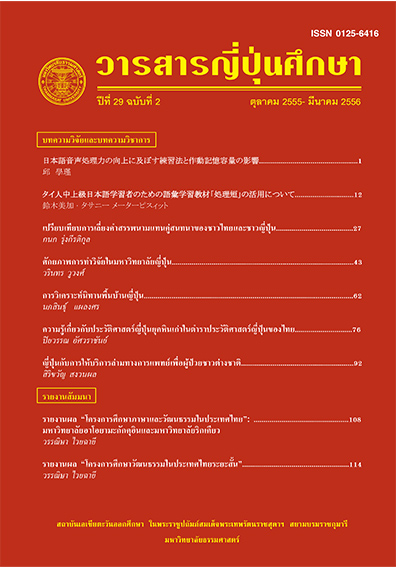เปรียบเทียบการเลี่บงคำสรรพนามแทนคู่สนทนาของชาวไทยและชาวญี่ปุ่น
บทคัดย่อ
The use of self-references and addressee terms for Thai andJapanese is infl uencedby various factors, such as age and gender, as well as the relationship between the speakerand the listener. As the self-references and addressee termsin Thai and Japanese can indicatethe relationship or social distance between the speaker and the listener, there are severalsituations when the speaker tries to avoid using self-references and addressee terms if thedetermination ofthe relationship between the speaker and the listener is not clear. The objectiveof this paper is to study how different Thais and Japanese avoid using addressee termswhen speaking with a stranger and with a new acquaintance based on these factors.The results show that Thais and Japanese have different ways of avoiding addresseeterms. The gender and age of the speaker are very important factors in using or not usingthe addressee terms in each case. However, the gender of the listener does not affect theuse or non-use of addressee terms in either Thai or Japanese. It was also found that in Thaiaddressee terms are often omitted if the ages of the speaker and the listener are nearly thesame, while the addressee terms in Japanese are often omitted if the listener is older. Whenspeaking with a new acquaintance, Thais tend to avoid addressee terms much more thanwhen speaking with a stranger. On the other hand, Japanese use fewer addressee terms in aconversation with a stranger to keep distance, and use addressee terms more frequently whenspeaking with a new acquaintance. Comparing the results between the two situations of astranger and a new acquaintance, Thais tend to consider the listener’s age prior to the socialdistance, while the Japanese do the opposite.Downloads
Download data is not yet available.




